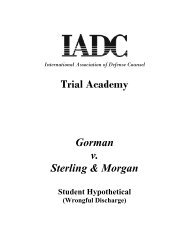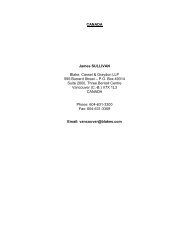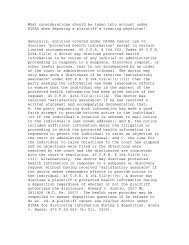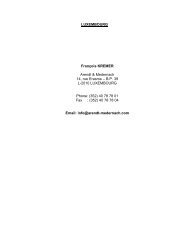Defense Counsel Journal - International Association of Defense ...
Defense Counsel Journal - International Association of Defense ...
Defense Counsel Journal - International Association of Defense ...
Create successful ePaper yourself
Turn your PDF publications into a flip-book with our unique Google optimized e-Paper software.
Page 452 DEFENSE COUNSEL JOURNAL–October 2012as a practical matter, it is common for adefendant’s first notice <strong>of</strong> an incident tobe actual service <strong>of</strong> a complaint.That affirmative defenses should betreated differently from allegations in aComplaint also is logical given thatfailure to raise an affirmative defense inan answer can result in waiver. It is onlyafter discovery has taken place that adefendant can properly flesh out thefactual basis <strong>of</strong> an affirmative defense.Rather than forcing a defendant to pleadfacts that may or may not be apparent atthe beginning <strong>of</strong> a case, the better andmore economical route would be to allowthe parties to develop support for theirdefenses through discovery. 82(6) No Prejudice to PlaintiffsWhether or not they would willinglyconcede the point, because plaintiffs havehad time to investigate the facts andcircumstances <strong>of</strong> an action before filing,they also may become aware <strong>of</strong> andanticipate the factual bases for manyaffirmative defenses. Indeed, the factsestablishing an affirmative defense cansometimes be established on the face <strong>of</strong>the plaintiff’s complaint. Therefore, thesufficiency <strong>of</strong> affirmative defenses “mustbe compared and considered inconnection with the complaint itself.” 83 Itlikely that an answer, with or withoutaffirmative defenses, will contain fewerfactual assertions than a complaint and still besufficient.).82 See Hanzlik v. Birach, No. 1:09cv221, 2009WL 2147845, at *4 (E.D. Va. July 14, 2009)(noting its preference for the parties to developfactual support for affirmative defensesthrough discovery).83 Schlottman, 2009 WL 1764855 at *1.is difficult for the plaintiff to showprejudice, when the allegations containedin plaintiff’s complaint provide thenecessary notice for the basis <strong>of</strong> anaffirmative defense.Likewise, while a defendant may nothave any facts within its knowledge tosupport a particular defense betweenservice <strong>of</strong> the Complaint and filing <strong>of</strong> itsanswer, plaintiffs are generally on noticethat certain defenses will be raisedwithout fail in certain actions. Forexample, a plaintiff in a product liabilityaction usually can anticipate that issues <strong>of</strong>comparative negligence, plaintiff’spossible misuse <strong>of</strong> the product and timelynotice <strong>of</strong> the claim will be raised. Itwould be hard for a plaintiff to showprejudice even from the bare assertion <strong>of</strong>an affirmative defense when plaintiff islikely aware <strong>of</strong> its factual applicability.One court noted the futile exercise <strong>of</strong>requiring a party to plead facts in support<strong>of</strong> its affirmative defenses by stating“[t]he factual allegations contained in thecomplaint and answer are necessarilyincorporated into a defendant’s recitation<strong>of</strong> affirmative defenses,” rendering it“absurd to require a defendant to re-pleadevery fact relevant to an affirmativedefense.” 84Accordingly, some courts haveargued that plaintiffs simply are notprejudiced by the boilerplate assertion <strong>of</strong>affirmative defenses. A defendant isrequired to plead affirmative defenses inorder “to avoid surprise and undue84 See Baum v. Faith Techs., Inc., No.10-CV-0144-CVE-TLW, 2010 WL 2365451, *3(N.D. Okla. June 9, 2010); LSI, 2012 WL359713 at 11 (“Re-pleading facts the opposingparty has already plead is not necessary to put[a party] on notice <strong>of</strong> [] defenses.”).












